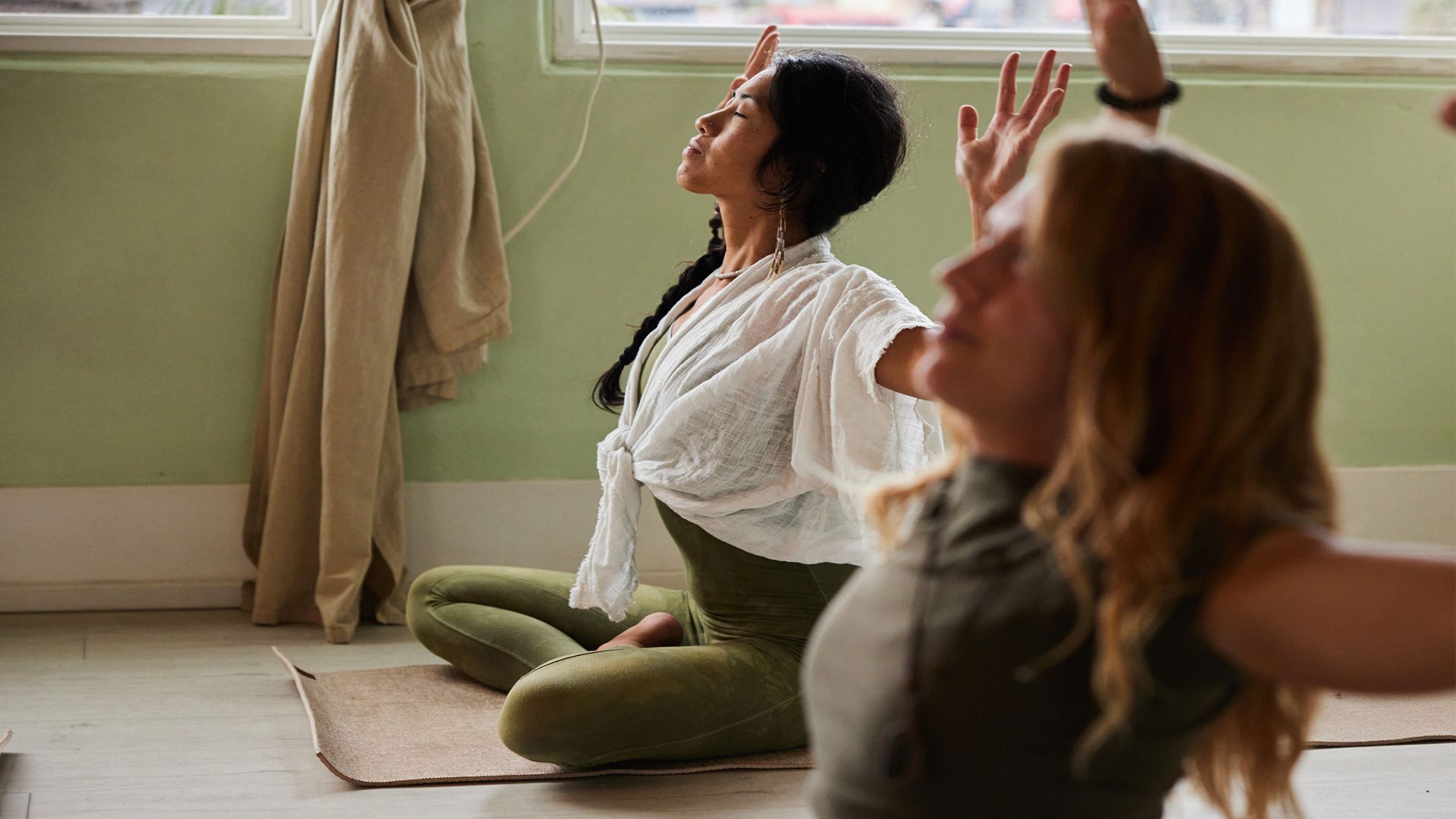There’s much modern buzz — and confusion — about the ancient concept of kundalini energy and kundalini awakenings. Perhaps you’ve come across videos of TikTokers documenting their own dramatic kundalini awakenings, or you’ve been curious to check out a kundalini yoga class, only to be put off by alarmist headlines about kundalini’s “dangers.” DailyOM reached out to experts to help explain this misunderstood, often life-altering experience so you can expect the unexpected.
What Is Kundalini Energy?
Before we talk about kundalini awakenings, it’s helpful to understand the concept of kundalini, which was described in the Upanishads, the sacred scriptures of Hinduism that date back to the fifth century B.C. The word “kundalini” was derived from the Sanskrit word kundal, meaning “coiled energy.”
Erin Elizabeth Downing, author of Kundalini Yoga Demystified: A Modern Guide to What It Is and How to Practice, tells DailyOM that kundalini is envisioned as traveling through the body’s energy centers, or chakras. “Your kundalini energy can be thought of as your most authentic self, your power, your intuition,” the expert says. This energy can lie dormant in the body, which can keep us from fully tapping into its power. Approaches such as yoga aim to open energy channels in the body so that kundalini can flow freely, allowing you to experience greater vitality.
Other cultures describe a similar concept of vital life energy, explains Marjorie Woollacott, PhD, an emeritus professor of the department of human physiology and member of the Institute of Neuroscience at the University of Oregon, who studies consciousness from a scientific perspective. “In China, it is known as chi, In Japan as qi. In the Hebrew tradition, it is Shekinah. The concept is universal.”
Interested in learning more? Check out 5-Week Kundalini Yoga for Chakras
What Is a Kundalini Awakening?
Not surprisingly, considering the mind-blowing nature of the phenomenon, the experts we talked to have a range of answers about what constitutes a kundalini awakening. Salimah Kassim-Lakha, a kundalini yoga teacher and founder of the online platform YogaVision.com, tells DailyOM it is a subtle unfolding that you work toward as part of an ongoing yoga practice. “Kundalini awakening is a rising of energy, a shift in consciousness,” Kassim-Lakha says. “I consider it not one big event but a gradual process. You may become more open-minded, less reactive, more willing to serve others.”
Others describe it more dramatically, almost like a sudden surge of energy through the body and mind. “A kundalini awakening is the spontaneous emergence of dormant spiritual energy,” says Woollacott, who published a 2021 paper on the phenomenon. “You may have physical symptoms such as tingling, trembling, or prickling. You may feel electricity along the spine. These physical sensations are often accompanied by a real sense of joy, a unity with everyone and everything around us.” (One blogger even described her own kundalini awakening as a whole-body orgasm.)
Woollacott says that in some cases, the experience can be transformative, causing the person to reevaluate their values and their relationship with others. They may become more altruistic and less materialistic. “People will say, ‘Oh my goodness! This is what life is all about! I finally understand.’”
Does a Kundalini Awakening Only Happen During Kundalini Yoga Practice?
“The practice of kundalini yoga involves mantras, breathwork, meditation, postures, and relaxation. It is a one-step-at-a-time, deliberate process,” says Kassim-Lakha. “The goal is to expand our consciousness and allow our authentic self to emerge.”
Kundalini yoga is just one route toward experiencing an energetic spiritual awakening. A spiritual awakening felt profoundly throughout both mind and body can be experienced in other contexts outside of yoga. People have reported experiencing them during prayer, deep introspection, and time in nature, says Woollacott.
“Kundalini awakening is a rising of energy, a shift in consciousness. Consider it not one big event but a gradual process. You may become more open-minded, less reactive, more willing to serve others.”
While some people actively seek out this shift of consciousness through contemplative practices, other people say they experienced an awakening spontaneously, with no preparation or warning. That was the case for Katrina Michelle, PhD, a psychologist, founder of The Curious Spirit psychotherapy practice, and an adjunct faculty member at New York University’s department of applied psychology.
“I was 20 years old and coming up from the subway in New York City as usual. Suddenly, I was overcome with a sense of instantaneous transcendence of time, space, place, and identity. I felt oneness and complete love and empathy for the strangers around me. It was a sea of bliss and peace.”
At the time, Michelle had no words to explain what she was feeling. “Later in talking to people from the Hindu tradition, they told me that my experience sounded like what they describe as a kundalini awakening.”
Are Kundalini Awakenings Common?
If you are heading off to your first kundalini yoga class, worried that you might experience an instant, life-changing zap, Kassim-Lakha offers reassurance. “In 20 years of teaching, I have never had a student say, ‘Wow, I just felt my head blow open and I can’t feel my feet!’”
She has had many students describe unusual sensations. “A student might tell me that all of a sudden they smelled a distinct fragrance or had very vivid dreams while practicing.”
But if you consider the category more broadly, spiritual awakenings accompanied by physical sensations may be far from rare. In a 2021 study in the journal Frontiers in Psychology, for example, British researchers interviewed 152 participants who’d had what they considered spontaneous spiritual awakenings, including what the researchers characterized as spontaneous kundalini awakenings (defined by the researchers as a subset of experiences that include physical sensations like shaking or tingling).
The study found many similarities in subjects’ reported experiences: 98 percent of the subjects described the experience as ultimately positive.
Benefits and Dangers of Kundalini Awakenings
The internet is abuzz with the idea that kundalini awakenings are somehow dangerous, with some people saying the experience can bring about a range of uncomfortable and disruptive physical and emotional symptoms.
The experts whom DailyOM spoke with were reassuring, but they note that insights can themselves be disruptive. Michelle points out, “After such a powerful experience, you might realize your current relationship or job or living arrangement doesn’t align with your true values. An awakening can be a catalyst for big changes. That can be uncomfortable, too.”
A kundalini awakening can be profound and powerful. Some people describe it as a blissful sense of oneness and connection, but for others, the experience can feel unsettling, even frightening, associated with physical sensations such as panic attacks, insomnia, or uncomfortable sensations of heat in the body, notes the Frontiers in Psychology study.
Be assured that the vast majority of the study subjects found such symptoms ultimately worth it. The awakening experience “was more likely to be perceived as positive in the long term even following negative short-term experiences,” note the study authors.
What Should You Do if You Think You Are Having a Kundalini Awakening?
Having a teacher or spiritual community can prepare you gradually and offer support for kundalini energy work, says Kassim-Lakha.
If you have had an out-of-the-blue experience as Michelle did, you might be left reeling. “When I first had this experience, I had no framework for understanding it and so I wondered if it could be the beginning of a psychotic break,” says Michelle. “It took a good decade for me to start to integrate what had happened. A first step is realizing you are not alone. Having the words for what you have experienced can be powerful.”
One place to find support is through the American Center for the Integration of Spiritually Transformative Experiences, suggests Michelle. She is currently working on a documentary, When Lightning Strikes, looking at others’ experiences of kundalini awakenings to promote greater understanding, and an online support community has come together around the film.
While her own kundalini awakening experience was disorienting, the psychologist credits it for changing the course of her life. “I now look at my experience as a gift.”

